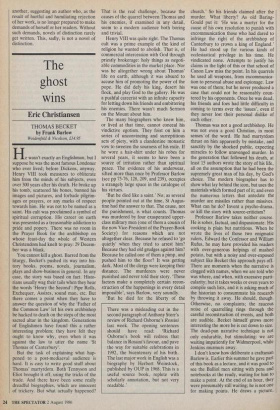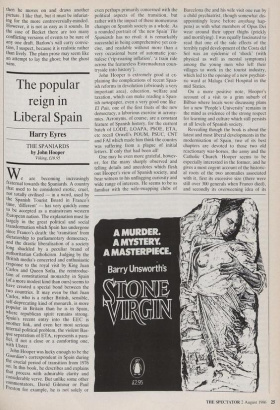The ghost wins
Eric Christiansen
THOMAS BECKET by Frank Barlow Weidenfeld & Nicolson, £14.95 He wasn't exactly an Englishman, but I suppose he was the most famous Londoner who ever lived; before Dickens, anyway. Henry VIII took measures to obliterate him from the minds of his subjects, even over 300 years after his death. He broke up his tomb, scattered his bones, banned his images and pictures, and forbade pilgrim- ages or prayers, or any marks of respect towards him. He was not to be named as a saint. His cult was proclaimed a symbol of spiritual corruption. His career on earth was presented as a treasonable addiction to pride and popery. There was no room in the Prayer Book for the archbishop on whose feast-day the whole of Western Christendom had knelt to pray: 29 Decem- ber was a blank.
You cannot kill a ghost. Barred from the liturgy, Becket's pushed its way into his- tory books, poems, novels, journalism, plays and show-business in general. In any case, the story was based on fact. Histo- rians usually wag their tails when they hear the words 'Henry the Second': Pipe Rolls, Exchequer, Assizes, sound man, etc. But there comes a point when they have to answer the question of why the 'Father of the Common Law' let his own archbishop be hacked to death on the steps of the most sacred altar in the kingdom. Generations of Englishmen have . found this a rather interesting problem; they have felt they ought to know why, even when it was against the law to utter the name `St Thomas of Canterbury'.
But the task of explaining what hap- pened to a post-mediaeval audience is hard. It is easy to write good stuff about Thomas' martyrdom. Both Tennyson and Eliot brought it off, using the tricks of the trade. And there have been some really dreadful biographies, which are innocent of trickery. But what actually happened? That is the real challenge, because the causes of the quarrel between Thomas and his enemies, if examined in any detail, seem to a modern audience both boring and trivial.
Henry VIII was quite right. The Thomas cult was a prime example of the kind of religion he wanted to abolish. That is, of commercial intercession with God through priestly brokerage: holy things as negoti- able commodities in the market place. Nor was he altogether wrong about Thomas' life on earth, although it was absurd to accuse him of promoting the power of the pope. He did defy his king, desert his flock, and play God to the gallery. He was a pushful careerist with an infinite capacity for letting down his friends and embittering his enemies. There wasn't much Sermon on the Mount about him.
The many biographers who knew him, or lived at that time, cannot conceal his vindictive egotism. They foist on him a series of unconvincing and surreptitious acts of piety, with a clandestine monastic vow to sweeten the sourness of his exile. If he wore a hair-shirt under his robes for several years, it seems to have been a source of irritation rather than spiritual peace. The evidence of his underwear, sifted more than once by Professor Barlow (see pp 75-76, 128, 209, and 239), occupies a strangely large space in the catalogue of his virtues.
'But he died like a saint.' No; as several people pointed out at the time, St Augus- tine had the answer to that. The cause, not the punishment, is what counts. Thomas was murdered by four exasperated upper- class military men (one of them a cousin of the now Vice-President of the Prayer-Book Society) for reasons which are not altogether clear. Because he refused to `go quietly' when they tried to arrest him? Because they had old grudges against him? Because he called one of them a pimp, and pushed him to the floor? It was getting dark. Most of the clergy were keeping their distance. The murderers were never punished and never told their story. 'These factors make a completely certain recon- struction of the happenings in every detail impossible', says Barlow, very soundly.
'But he died for the liberty of the church.' So his friends claimed after the murder. What liberty? As old Baring- Gould put it: 'He was a martyr for the cause of his own resolution to punish with excommunication those who had dared to infringe the right of the archbishop of Canterbury to crown a king of England.' He had stood up for various kinds of ecclesiastical privilege in his time. He vindicated none. Attempts to justify his claims in the light of this or that school of Canon Law miss the point. In his quarrels he used all weapons, from excommunica- tion to personal abuse and espionage. Law was one of them; but he never produced a case that could not be reasonably coun- tered by his opponents. Once he was dead, his friends and foes had little difficulty in coming to terms over the 'issues', even if they never lost their personal dislike of each other.
Thomas was not a good archbishop. He was not even a good Christian, in most senses ' of the word. He had martyrdom thrust on him apparently by mistake, and sanctity by the shocked public, expecting miracles to follow unavenged murder. In the generation that followed his death, at least 15 authors wrote the story of his life, all on the assumption that he had been the supremely great man of his day, by God's choice. The modern biographer has to show what lay behind the icon, but uses the materials which formed part of it; and even the numerous letters that antedate the murder are missiles rather than missives. What can he do? Invent a psycho-drama, or kill the story with source-criticism?
Professor Barlow takes neither course. He is sober, factual, and dispassionate. His cooking is plain but nutritious. When he wrote the lives of those two enigmatic rulers, Edward the Confessor and William Rufus, he may have provided his readers with over-generous helpings of mashed potato, but with a noisy and over-exposed subject like Becket this approach pays off. There are moments when the narrative is clogged with names, when we are told who was where, and when, with excessive parti- cularity; but it takes weeks or even years to compile such lists, and it is asking much of the historian to consummate his research by throwing it away. He should, though. Otherwise, no complaints; the raucous noise of quarrelling rings through the careful reconstruction of events, and both are audible. Becket himself grows more interesting the more he is cut down to size. The dead-pan narrative technique is not only endurable, but stimulating: we are waiting impatiently for Widmerpool, while Jenkins murmurs away.
I don't know how deliberate a craftsman Barlow is. Earlier this summer he gave part of this book as a lecture, and it was good to see the Balliol men sitting with pens and notebooks at the ready, waiting for him to make a point. At the end of an hour, they were presumably still waiting; he is not one for making points. He draws a picture, then he moves on and draws another Picture. I like that, but it must be infuriat- ing for the more controversially-minded. However, it is not as easy as it sounds. In the case of Becket there are too many conflicting versions of events to be sure of any one draft. Barlow's will carry convic- tion, I suspect, because it is realistic rather than lively. The plain prose may seem like an attempt to lay the ghost; but the ghost wins.











































 Previous page
Previous page